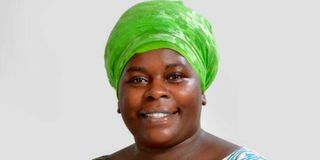What politics has taught us

Ms Immaculate Shamala, a 2017 aspirant for Trans Nzoia Woman Representative seat, advises women to employ a strategic self-branding in politics.
What you need to know:
- Many female aspirants suffer from political violence.
- Ending the violence could take change of communities’ perception against women leadership and effective implementation of anti-political violence laws.
- Women encouraged to "package themselves as “me” so that the electorate can appreciate you as you."
“I could mount my posters and the following morning, I find a male aspirant has posted his over mine.”
This is a case of vandalism, which is a form of political violence that Ms Rahab Robi faced during her 2017 campaigns when she sought to be elected as Member of Parliament for Kuria East.
“Many other female aspirants suffer from the same. It’s a big challenge and it’s very intimidating,” she shared during a March 31, ‘Sanitising hands of violence in Kenyan politics’ webinar.
It was jointly organised by Hekima University College’s Centre for Research, Training, and Publication, Hekima Institute of Peace Studies and International Relations and Centre for Multiparty Democracy – Kenya.
From the discussions, it was clear the attacks do not end with the female aspirant. They are extended to her family members, support team and voters.
“The stronger you are as a female candidate, the more the intimidation, harassment and character assassination,” Ms Robi said.
Ending the violence could take change of communities’ perception against women leadership and effective implementation of anti-political violence laws.
“To date, there are communities who still believe a woman’s place is in the kitchen and so you will be told you deserve the violence because you are intruding on a male’s space,” she observed.
She identified political parties as a hindrance to women’s fair participation in politics.
“Sometimes a man is given precedence during party primaries because he has enough resources for campaigns,” she said.
Challenge status quo
She, however, encouraged women to challenge the status quo and seek elective seats.
“Wake up, discover your potential, strategise well, believe in yourself and brand yourself well…nothing is impossible! The likes of Millie Odhiambo, Martha Karua, the late Wangari Maathai and many more made it,” she said.
She noted that men and women should perceive politics as a respectable career which requires one to put his or her best foot forward.
She decried the cyber bullying of women, which she described as becoming “very normal” at a time when women’s voices need to be heard.
To avoid extension of violence to the family members, Ms Immaculate Shamala, a 2017 aspirant for Trans Nzoia Woman Representative seat, advised women to employ a strategic self-branding.
“I encourage my fellow women to package themselves as “me” so that the electorate can appreciate you as you. Support you as you and the ideologies and principles that you stand for,” she said.
She discouraged the all-time perception that women have to contend with the violence in politics because “politics is violent.”
“Must we behave like animals to elect leaders? Can we have a new dawn where we agree to disagree on principles and ideologies?” she asked.
Ms Malasen Hamida Twahir, a Nairobi-based politician, said creating a rapport with the people the women seek to represent could save them from violent politics.
“We have 17 months to the general election, let us engage in community activities and advocate for peace,” she said.





